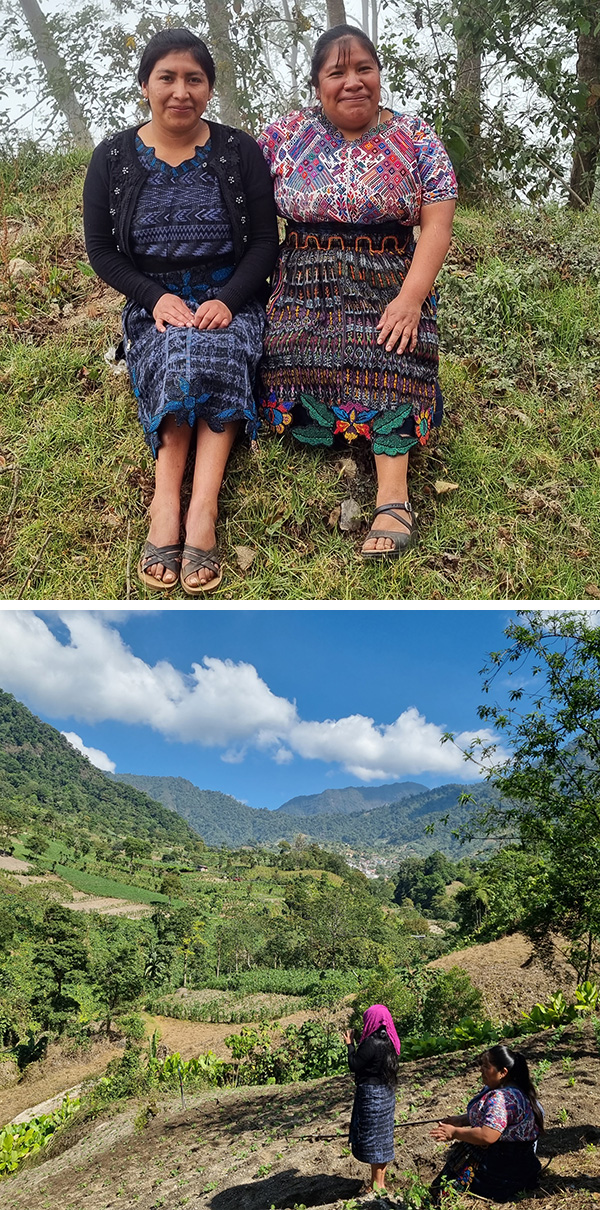Stories of Change

Top: Juana (left) and Catarina. Bottom: Both women in El Rincon.
Catarina and Juana: Two women Committed to Their Families and Their Community
Catarina Juarez De Leon and Juana Lopez Garcia are local promoters in a CWS-supported food security and nutrition project in Maya Mam communities in Quetzaltenango, Guatemala. A total of 490 families participate.
Catarina is a brave single mother who struggles to raise her daughters Luci and Imelda. She completed her primary studies and has been working as a promoter for the project for more than two years. Juana is a young single woman who supports her parents and siblings. She is also a kindergarten teacher who due to the lack of employment launched a small cafeteria as an entrepreneur which had to close due to the impact of the pandemic. Juana has been a promoter in the project for more than a year.
The project provides families with access to agricultural resources such as seeds, fertilizers, sheep and pigs as well as technical guidance for the production and use of food and the improvement of nutrition. Income generation is also boosted through the sale of some of the agricultural products. Likewise, the rights and empowerment of women, who are more than 90% of the direct participants in the program as heads of their families, are promoted.
Due to the pandemic and the limitations of mobilization and in person meetings, Catarina and Juana have become our local partner CIEDEG’s eyes, ears and hands for this project at local level on a daily basis. They buy and distribute seeds and other agricultural inputs, facilitate training on women’s rights, conduct monitoring by visiting families at their gardens, and report to CIEDEG the difficulties and progress encountered. Most recently, they administered a survey for a participatory diagnosis of availability, access, use and consumption of food, and height-weight in girls and boys under five years of age.
When asked what they have learned through the project, they said that “living with other women and with the communities has given us new lessons.” They share that they have learned about agriculture, food security and women’s rights. They do not seem to realize the great importance of their contribution as they discuss their commitment to their community and the gratitude they feel for being able to work on the project. It is no coincidence that the first word they taught me in their language, Maya Mam, was ‘thank you’: Chjonte.
Regarding the rights and participation of women, they said that it is important to value oneself as a woman and know and defend one’s own rights. Juana said, “in San Martín and San Juan, and even in my family, women did not allow themselves a place to participate in the community or were prohibited participation by their husbands. Women were discriminated against.” This underlines that only men had the right to work and participate in community activities, and women were prohibited to do so. Catarina says, “that’s why it’s important to take advantage of opportunities and participate.” And although they now see more participation of women and the possibility for many women to continue their studies, the changes are still insufficient. “We have to encourage other women to know their rights and value themselves, that is why it is important to educate and train women,” says Juana.
And in the context of the International Women’s Day, Juana says, “I would like to tell all girls, young ladies and women that we must know our rights, value ourselves and participate in all spaces to learn and put equality into practice. It is necessary that we participate in order to combat discrimination and that we value girls and women”. Catarina adds “it is important to celebrate this March 8th the International Women’s Day, because it talks about equality for all. All women have the right to work, grandmothers, mothers, daughters, we all have rights. I salute all women on this very day.”
This story was written by Erwin Garzona, CWS Regional Representative for Central America and Mexico.
